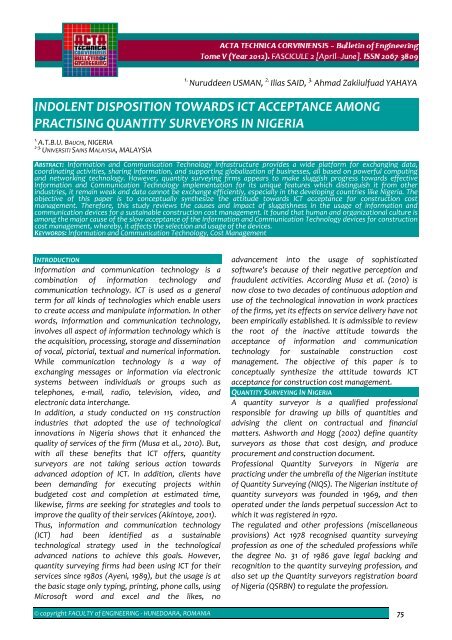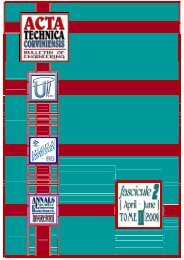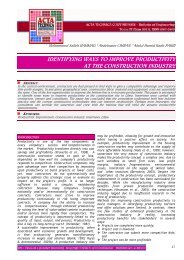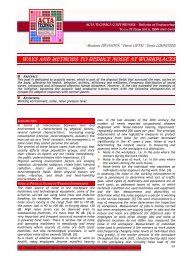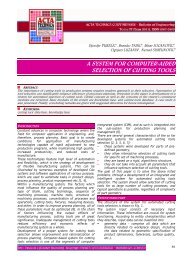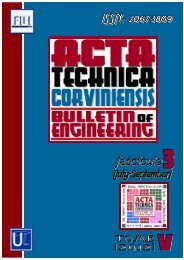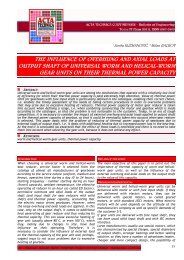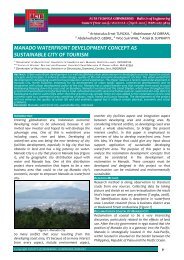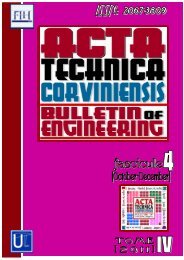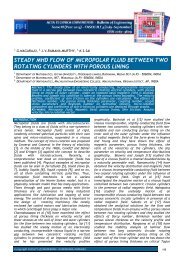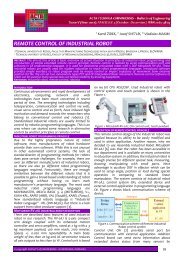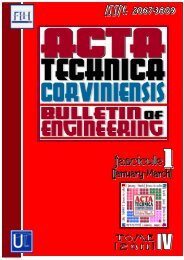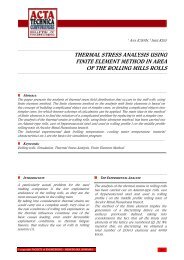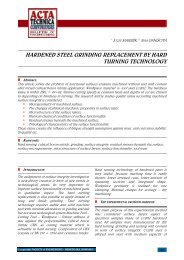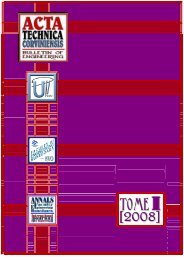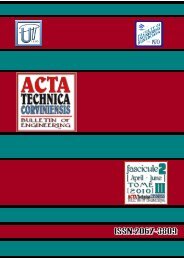Editorial & Advisory Board - Acta Technica Corviniensis
Editorial & Advisory Board - Acta Technica Corviniensis
Editorial & Advisory Board - Acta Technica Corviniensis
You also want an ePaper? Increase the reach of your titles
YUMPU automatically turns print PDFs into web optimized ePapers that Google loves.
1.<br />
Nuruddeen USMAN, 2. Ilias SAID, 3. Ahmad Zakiiulfuad YAHAYA<br />
INDOLENT DISPOSITION TOWARDS ICT ACCEPTANCE AMONG<br />
PRACTISING QUANTITY SURVEYORS IN NIGERIA<br />
1.<br />
A.T.B.U. BAUCHI, NIGERIA<br />
2‐3.<br />
UNIVERSITI SAINS MALAYSIA, MALAYSIA<br />
ABSTRACT: Information and Communication Technology infrastructure provides a wide platform for exchanging data,<br />
coordinating activities, sharing information, and supporting globalization of businesses, all based on powerful computing<br />
and networking technology. However, quantity surveying firms appears to make sluggish progress towards effective<br />
Information and Communication Technology implementation for its unique features which distinguish it from other<br />
industries, it remain weak and data cannot be exchange efficiently, especially in the developing countries like Nigeria. The<br />
objective of this paper is to conceptually synthesize the attitude towards ICT acceptance for construction cost<br />
management. Therefore, this study reviews the causes and impact of sluggishness in the usage of information and<br />
communication devices for a sustainable construction cost management. It found that human and organizational culture is<br />
among the major cause of the slow acceptance of the Information and Communication Technology devices for construction<br />
cost management, whereby, it affects the selection and usage of the devices.<br />
KEYWORDS: Information and Communication Technology, Cost Management<br />
INTRODUCTION<br />
Information and communication technology is a<br />
combination of information technology and<br />
communication technology. ICT is used as a general<br />
term for all kinds of technologies which enable users<br />
to create access and manipulate information. In other<br />
words, Information and communication technology,<br />
involves all aspect of information technology which is<br />
the acquisition, processing, storage and dissemination<br />
of vocal, pictorial, textual and numerical information.<br />
While communication technology is a way of<br />
exchanging messages or information via electronic<br />
systems between individuals or groups such as<br />
telephones, e‐mail, radio, television, video, and<br />
electronic data interchange.<br />
In addition, a study conducted on 115 construction<br />
industries that adopted the use of technological<br />
innovations in Nigeria shows that it enhanced the<br />
quality of services of the firm (Musa et al., 2010). But,<br />
with all these benefits that ICT offers, quantity<br />
surveyors are not taking serious action towards<br />
advanced adoption of ICT. In addition, clients have<br />
been demanding for executing projects within<br />
budgeted cost and completion at estimated time,<br />
likewise, firms are seeking for strategies and tools to<br />
improve the quality of their services (Akintoye, 2001).<br />
Thus, information and communication technology<br />
(ICT) had been identified as a sustainable<br />
technological strategy used in the technological<br />
advanced nations to achieve this goals. However,<br />
quantity surveying firms had been using ICT for their<br />
services since 1980s (Ayeni, 1989), but the usage is at<br />
the basic stage only typing, printing, phone calls, using<br />
Microsoft word and excel and the likes, no<br />
advancement into the usage of sophisticated<br />
software’s because of their negative perception and<br />
fraudulent activities. According Musa et al. (2010) is<br />
now close to two decades of continuous adoption and<br />
use of the technological innovation in work practices<br />
of the firms, yet its effects on service delivery have not<br />
been empirically established. It is admissible to review<br />
the root of the inactive attitude towards the<br />
acceptance of information and communication<br />
technology for sustainable construction cost<br />
management. The objective of this paper is to<br />
conceptually synthesize the attitude towards ICT<br />
acceptance for construction cost management.<br />
QUANTITY SURVEYING IN NIGERIA<br />
A quantity surveyor is a qualified professional<br />
responsible for drawing up bills of quantities and<br />
advising the client on contractual and financial<br />
matters. Ashworth and Hogg (2002) define quantity<br />
surveyors as those that cost design, and produce<br />
procurement and construction document.<br />
Professional Quantity Surveyors in Nigeria are<br />
practicing under the umbrella of the Nigerian institute<br />
of Quantity Surveying (NIQS). The Nigerian institute of<br />
quantity surveyors was founded in 1969, and then<br />
operated under the lands perpetual succession Act to<br />
which it was registered in 1970.<br />
The regulated and other professions (miscellaneous<br />
provisions) Act 1978 recognised quantity surveying<br />
profession as one of the scheduled professions while<br />
the degree No. 31 of 1986 gave legal backing and<br />
recognition to the quantity surveying profession, and<br />
also set up the Quantity surveyors registration board<br />
of Nigeria (QSRBN) to regulate the profession.<br />
© copyright FACULTY of ENGINEERING ‐ HUNEDOARA, ROMANIA 75


